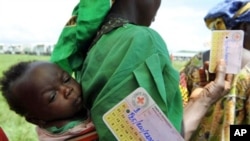The U.N. Children's Fund says it needs more than $263 million for emergency funding in West and Central Africa this year.
UNICEF's emergency funding needs for West and Central Africa have increased this year because of flooding, higher food prices, and outbreaks of disease including cholera, measles, yellow fever, and meningitis. There are also increased humanitarian needs in the Democratic Republic of Congo and Chad where UNICEF says it is taking urgent action to protect children from the worst forms of violence and abuse.
Grant Leaity, UNICEF's regional advisory for emergencies in West and Central Africa, says Congo's problems are made worse by Uganda's rebel Lord's Resistance Army.
"There are a number of what we would say are early-warning signals or alerts which are again coming up in the eastern Kivu. There is also the situation with the LRA in the northeast. There is a conflict once again in the Equatorial Province, and that has caused a level of internal displacement to nearly 100,000 people. There are 110,000 refugees in the Republic of Congo and around 20,000 refugees now in Central African Republic," he said.
Leaity says Chad is facing both below-average harvests and the potential insecurity of the government asking the United Nations not to renew the mandate of its peacekeeping force in the eastern border region with Sudan.
"In Chad we have a combination. It is one of the Sahel countries, so first and foremost we are concerned about the food security and the nutrition situation. There is also the discussion of the end of the mandate of the peacekeeping forces, MINURCAT, and that could have a lot of implications," he said.
In Chad and the Democratic Republic of Congo, Leaity says ensuring access to water and sanitation, health care, nutrition, and education is complicated by conflict.
"Countries which have an armed-conflict situation have a particular difficulty in terms of delivering humanitarian aid, because as a consequence of the conflict the basic infrastructure and services are no longer really functional," he said. "At the same time if you then have a flood, an epidemic or any other form of environmentally-driven crisis, the capacity to react in terms of all of the local structures is very low."
UNICEF says it needs funding to fight malnutrition and flooding in Niger, Guinea, and Mauritania. There are smaller-scale emergencies or post-conflict transitions in Benin, Cameroon, the Republic of Congo, Ghana, Guinea-Bissau, Liberia, Mali and Togo.
UNICEF Needs More than $263 Million for West, Central Africa




